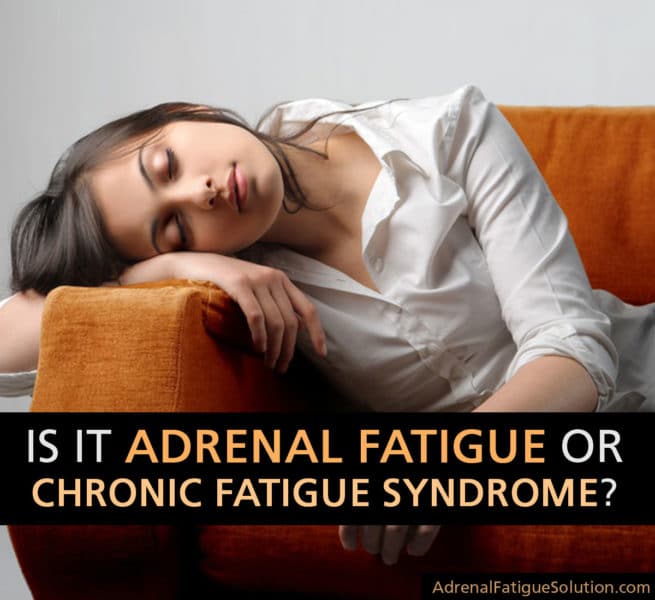Both chronic fatigue and adrenal fatigue have a number of signs and symptoms in common. Because the medical profession still views both conditions with a certain amount of skepticism, it can be extremely difficult for sufferers to get an accurate diagnosis, and therefore obtain the help they need to begin their journey back to health.
The following definitions may better explain why the two syndromes are often confused:
Chronic fatigue syndrome: A disorder of unknown cause, characterized by persistent and profound fatigue.
Adrenal fatigue syndrome: A condition that arises after a period of prolonged, intense stress and characterised by feelings of fatigue that are not relieved by sleep.
For people with no experience of adrenal fatigue, it may seem that both conditions are one and the same. However, there are a number of key differences. As healing protocols for the two are quite different in their approach, it’s of paramount importance to be really clear about the cause of your fatigue before embarking on a health program.
The aim of this article is to explain the differences between adrenal and chronic fatigue in more detail. Not only will this help you get the correct diagnosis for your condition, but will also provide you with the necessary tools to explain what’s going on for you to family, friends and work colleagues.
What Is Adrenal Fatigue?
In common with people coping with chronic fatigue, sufferers of adrenal exhaustion may not display any obvious outward signs of ill health. They may get up and go to work like everyone else, but underneath they’re living with persistent lethargy and feelings of being generally unwell.
The difference for adrenal fatigue sufferers is that their constant tiredness is caused by an inability of the adrenal glands to cope with chronic, prolonged stress.
Unlike CFS (Chronic Fatigue Syndrome) which is often triggered by a viral infection and can come on quite suddenly, adrenal fatigue usually takes years to develop. Continual stress takes its toll on the adrenals by putting the body into a state of perpetual “fight or flight”. This forces the adrenals to make ever increasing supplies of cortisol and other stress hormones to bring the situation under control.
Eventually the natural sleep / wake cycle is disrupted, and other unpleasant symptoms such as weight gain and even hair loss begin to creep in. Sufferers can function in this way for many years before they finally seek help.
How Is Adrenal Fatigue Different Than Chronic Fatigue?
Chronic fatigue syndrome (also known as myalgic encephalomyelitis, or ME) is quite different to adrenal fatigue. Most importantly, burnout is not the only factor which sets the wheels of ill health in motion.
Often the trigger for chronic fatigue is a viral infection such as glandular fever (the condition was previously known by the rather derogatory name of “Yuppie Flu”) or a bacterial infection such as pneumonia. For this reason, many practitioners firmly place the focus of treatment on the immune system rather than looking to the endocrine system as the root cause of fatigue. Sufferers also have a number of other differentiating symptoms that are not usually present in people with adrenal exhaustion. These include:
- A persistent sore throat that is unresponsive to conventional treatment
- Muscle or joint pain accompanied by tender lymph nodes
- Exercising makes the symptoms worse
- There are intermittent periods of relief followed by unexplained relapses
There’s also the possibility that people with chronic fatigue syndrome may go on to develop adrenal fatigue as their illness progresses. This is because stress (which is common to both conditions) can predispose a person to its onset, or exacerbate the symptoms. Unfortunately, for many sufferers of chronic fatigue this means that their illness often serves as a “welcome mat” paving the way for adrenal exhaustion.
The following table may be helpful in highlighting the differences between the two conditions:
| Adrenal Fatigue | Chronic Fatigue |
| Not commonly recognised by mainstream medicine | Generally accepted by the medical profession as a genuine condition |
| A tendency to gain weight | Lack of appetite and weight loss |
| Takes many years to develop | Can appear suddenly without warning |
| Triggered by overworked adrenal glands and an imbalance in the HPA axis | Thought to be triggered by a viral or bacterial infection |
| Exercise can help to relieve symptoms | Exercise makes symptoms worse |
Takeaway
There are a number of conditions other than CFS and adrenal exhaustion which also cause sufferers to display symptoms of persistent fatigue. This includes thyroid disorders, depression and certain autoimmune conditions. Getting to the root cause of your illness can be a long process of trial and error, often involving a battery of tests which may or may not provide an accurate diagnosis.
Working with a reputable practitioner with experience in treating these kinds of health issues can often save a great deal of time and energy and money. This is because although there is some commonality in the treatment of both adrenal and chronic fatigue, the same approach simply won’t work in both cases.
If you’re not sure what to do next, our Adrenal Fatigue Solution ebook contains lots of information on tests that your doctor can run, or that you can order yourself.




Not sure I can trust info that says that exercise relieves adrenal fatigue. My poor tolerance of even mild exercise was the first thing that really tipped me off that something was wrong. Testing revealed HPA and female hormone imbalances consistent with severe adrenal fatigue.
It all depends how fatigued you are and how dysfunctional your HPA axis has become, but most people can tolerate mild exercise. It’s usually a good thing to keep moving.
CFS/ME symptom, lack of appetite and weight loss?? I WISH!! I will crawl to the fridge/pantry to eat any stodge I can find. I could eat a scabby horse and funnily enough, I’ve got fat! Love to All.